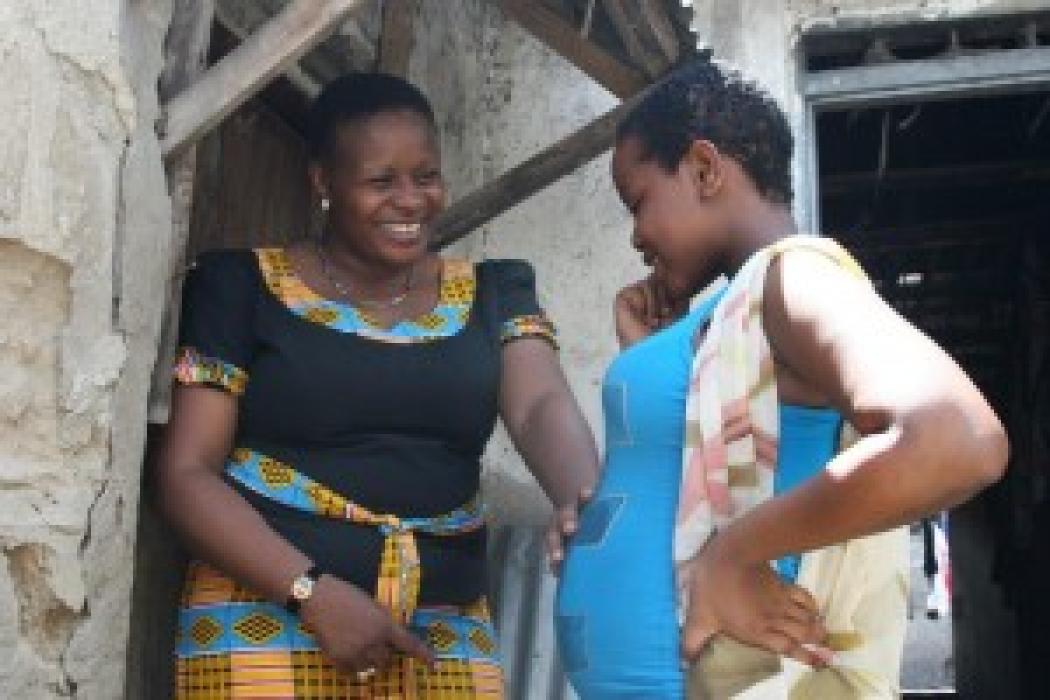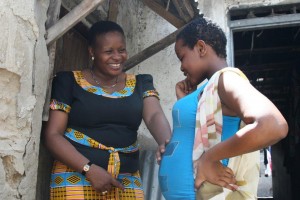Frontline Health Workers: Changing lives, influencing policy

By Lisa Meadowcroft, Executive Director, AMREF USA
In the slums of Tandale just outside of Dar es Salaam, Tanzania, 17-year-old sex worker Veronika wonders how she will ever take care of her newborn. At seven months pregnant, her clients are diminishing, she can’t afford rent and her family back home in the village miles away from urban Dar has no means to help her, let alone a new baby.
Lilian Msaki is a frontline health worker who works on AMREF’s largest, country-wide HIV prevention, testing and counseling program, Angaza Zaidi, mostly funded by United States donors. Lilian is part of a new initiative in HIV testing in Tanzania – working with at-risk, marginalized populations to stem the rapid transmission of HIV/AIDS within vulnerable and mostly neglected, communities. She has been visiting communities of sex workers for more than one year now providing counseling on prevention, treatment and safe sex.
Lilian is quite sure Veronika is HIV positive – because like almost all young women who are involved in sex work, Veronika has great difficulty imposing condom use on her clients. This vulnerability makes Veronika and young women like her especially open to unintended pregnancies and potential HIV infection.
Lilian’s commitment to Veronika and others is remarkable. Knowing your HIV status is a first step to living healthily with HIV, so on her personal time, Lilian offers to take Veronika for a prenatal checkup and an HIV test. If Veronika learns she is living with HIV, she can plan to have her baby at the clinic and keep her child free from HIV by adopting mother-to-child prevention strategies during and after the delivery.
How does Lilian’s work fit into the bigger picture? And why is her role as a frontline health worker so important to all of us?
 Lilian Msaki, AMREF frontline health worker with 17-year-old pregnant sex worker in the slums of Tandale, Dar es Salaam, Tanzania.
Lilian Msaki, AMREF frontline health worker with 17-year-old pregnant sex worker in the slums of Tandale, Dar es Salaam, Tanzania.
Courtesy AMREF
Lilian and her colleagues are working with populations who are deeply stigmatized in their communities. Yet these groups have high incidences of HIV infections, and over the past few years, engaging with sex workers, men who have sex with men (MSM) and other high-risk groups, has become a priority for global health agencies like the U.S. Agency for International Development (USAID). AMREF has long worked to improve the knowledge and health not only of marginalized populations, but also of other vulnerable communities such as miners and fisherman who live in remote areas for long periods away from their families.
It is precisely in these high-risk, marginalized populations that even more efforts need to be directed toward prevention, testing and counseling. In reaching out to these communities, Lilian and her team have developed innovative new models of service delivery, models that may well define best practices and potentially national policies in effective strategies for treating high-risk populations.
For instance, Lilian has learned that she must go ‘door-to-door’ to reach potential clients, a labor intensive, painstakingly long investment in time and effort. While AMREF has already staged HIV information seminars in local bars where sex workers meet clients, actually going from one door to the next provides a more confidential setting and ultimately, a more effective outcome in convincing individuals to get tested, treated and at least use condoms to prevent transmission.
In reaching out to men having sex with men, Lilian also has learned the importance of networks in identifying individuals in need of treatment. Especially in such adverse conditions of stigma, discrimination and violence, where in many African countries homosexuality is against the law, it is essential to develop personal relationships within these communities to facilitate service delivery to all members. Without the cooperation of a network within the marginalized group itself, it would be impossible to gain full access, build trust and deliver initiatives that curb the spread of HIV/AIDS within these tightly contained communities.
And why is Lilian’s role as a frontline health worker so important to us? Why does it matter that she spends hours upon hours, often of her own personal time, helping vulnerable individuals cope with their health status?
It matters because without Lilian’s dedication and intervention, many people would not learn their HIV status and wouldn’t know how to live healthily and protect others against HIV/AIDS. As a frontline health worker, Lilian not only counsels and treats individuals, but she and AMREF help influence best practices, national health policy and the capacity of each country to reduce the economic, social and health impact of HIV/AIDS.
That’s in line with the U.S. government’s policy of creating more stable and healthy populations through foreign assistance partnerships with developing countries. And that’s not only good for Lilian’s clients, it’s good for all of us.not only counsels and treats individuals, but she and AMREF help influence best practices, national health policy and the capacity of each country to reduce the economic, social and health impact of HIV/AIDS.
